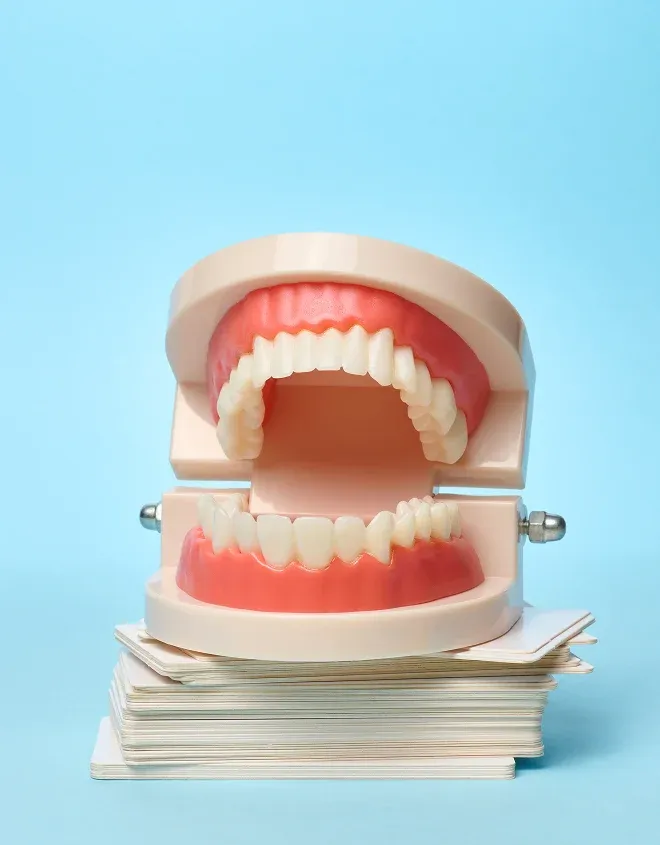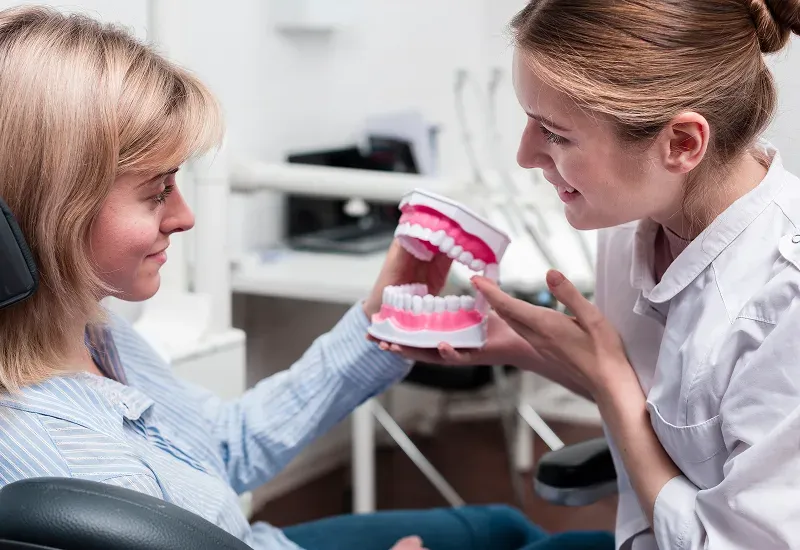Full vs Partial Dentures: Which Is Right for You?
by Dr. Azadeh Hosseini
08 July 2025

In the evolving world of dental restoration options, many people are looking for the best tooth replacement solutions that balance function, comfort, and appearance. For individuals dealing with missing teeth, the question of full vs partial dentures is a common one. Understanding the types of dental dentures available can help you make a confident and informed decision.
Dentures today are more advanced than ever, with improvements in materials like acrylic dentures and customization using digital dentistry. But with options like full dentures and partial dentures, how do you determine which denture type is best for me? This blog will help break it down so you can feel more certain when choosing dentures.

Understanding the Types of Dental Dentures
Before comparing full vs partial dentures, it's essential to understand the types of dental dentures available.
Full Dentures: A Complete Tooth Replacement Option
Full dentures, also known as complete dentures, are designed to replace upper and lower dentures entirely. They are ideal for individuals who have lost all their teeth in a dental arch or have severely damaged teeth that cannot be saved.
- These dentures sit directly on the gums and are often made of acrylic dentures or other modern materials.
- Most commonly, full dentures are recommended when the need for full dentures becomes a real concern — typically due to decay, gum disease, or trauma.
Full dentures offer a complete restoration of aesthetics and function, but they require an adjustment period and may feel bulky at first for some users.
Partial Dentures: Filling the Gaps
Partial dentures are a great solution for people who still have some healthy natural teeth. These removable appliances attach to the remaining teeth and fill the spaces left by missing ones.
- Removable partials are usually crafted from acrylic, metal frameworks, or flexible thermoplastics.
- A key consideration is: are partial dentures enough to restore your smile and function? For many, the answer is yes — especially when tooth loss is limited to a few teeth in one arch.
- Partial dentures not only help in chewing and speaking more effectively but also prevent remaining teeth from shifting into empty spaces.

Full vs Partial Dentures: How to Decide Between Dentures
You might be asking, how to decide between dentures when both options seem effective. The decision primarily depends on several individual factors:
1. Extent of Tooth Loss
If you're missing all teeth in either the upper or lower jaw, full dentures are generally recommended. In contrast, partial dentures are ideal for those who still retain some healthy teeth.
2. Oral Health and Bone Structure
The condition of your gums and bone structure affects your denture fit and comfort. For example, those with severe bone loss may need specially fitted acrylic dentures or explore removable partials until a long-term decision is made.
3. Aesthetic and Lifestyle Preferences
Full dentures can restore a uniform smile, while partial dentures preserve your natural teeth, offering a blended and more natural look. Ask yourself: what’s better, full or partial dentures, based on your lifestyle, appearance goals, and comfort level.
Dental Restoration Options in 2025: What's New?
Modern tooth replacement solutions have come a long way. In 2025, many dental clinics use digital impressions to create better-fitting upper and lower dentures with minimal discomfort. Customization has also improved with lighter materials, stronger bases, and better flexibility.
Some of the top dental restoration options today include:
- Acrylic dentures made with digital milling technology
- Removable partials with flexible, gum-colored bases for better aesthetics
- Personalized dentures based on facial analysis and bite dynamics
These advancements make choosing dentures a more comfortable process than ever before.
When Do You Need Full Dentures or Partial Dentures?
Understanding when do you need full dentures or are partial dentures enough depends on clinical evaluation and personal needs. Here are some key signs for both:
You Might Need Full Dentures If:
- All or most teeth in an arch are missing or damaged
- Remaining teeth are non-restorable
- You're seeking a complete transformation of your bite and smile
You Might Need Partial Dentures If:
- You still have healthy teeth that can anchor a denture
- You're experiencing early to moderate tooth loss
- You want a more affordable, less invasive solution for now
Ultimately, the question of which denture type is best for me is best answered after a professional dental consultation. But having this knowledge prepares you to make a decision that fits both your dental needs and personal comfort.
Removable Partials vs Full Dentures: Choosing Dentures That Fit You
There’s no one-size-fits-all solution when it comes to choosing dentures. While removable partials are often more comfortable for those with limited tooth loss, full dentures serve as a reliable choice for those needing full-mouth restoration.
If you’re still wondering what’s better, full or partial dentures, consider the following:
- Full dentures may require more adaptation but provide a complete solution.
- Partial dentures can often feel more natural because they incorporate your real teeth.
Many patients start with removable partials and later transition to full dentures as their dental condition changes over time. This phased approach allows time to adjust, while still improving daily function and appearance.
Adapting to Dentures: What to Expect After Getting Them
Whether you opt for full dentures or partial dentures, there's an adjustment phase. Knowing what to expect can help ease the transition and set realistic expectations.
Initial Fit and Comfort
- New acrylic dentures might feel bulky or loose at first.
- It may take a few days or weeks to get used to speaking and eating with them.
- Mild irritation or increased saliva production is normal in the beginning.
Over time, your muscles will adapt, and the dentures will feel like a natural part of your mouth. Follow-up visits ensure that your upper and lower dentures are fitting correctly and comfortably.
Maintenance and Lifestyle Considerations
Proper care extends the life of your dentures and protects your oral health. Whether you’re using removable partials or a full set, daily maintenance is essential.
To maintain your dentures, clean them daily using a soft-bristle brush and a non-abrasive cleanser to avoid scratching the surface. It's also important to soak them overnight in a denture solution, which helps prevent bacteria buildup and keeps them fresh. Always handle your dentures with care—materials like acrylic can still break if dropped. Additionally, lifestyle factors play a role in choosing the right dentures. Individuals with active routines or jobs that require frequent speaking may benefit from lightweight, high-performance materials and may require more frequent fitting sessions to ensure optimal comfort and function.
Still Not Sure Which Denture Type Is Best for You?
Choosing dentures isn’t always a straightforward decision. Some patients wonder: what’s better full or partial dentures? The answer depends on your specific oral condition, number of missing teeth, and lifestyle needs.
For example, if you have several healthy teeth remaining, partial dentures may offer a more stable and conservative solution. On the other hand, if most or all of your teeth are missing or need extraction, full dentures provide complete support and function.
The best way to determine which denture type is best for me is through a personalized dental consultation where your oral health, bone density, and future goals are taken into account.
Final Thoughts
Choosing the right denture solution is a significant decision, especially when considering long-term comfort and daily functionality. Whether you need full dentures to restore a complete arch or partial dentures to fill smaller gaps, understanding your needs, exploring the latest dental restoration options, and discussing it with a qualified professional will make your journey easier. The decision between full vs partial dentures is not only about what's missing—but about how you want to smile, eat, and live each day with confidence. Trust the process, explore all tooth replacement solutions, and choose what truly feels right for you.
Contact your Concord dentist, Dr. Azadeh Hosseini, DDS, at Top Concord Dental to learn more about Full vs Partial Dentures: Which Is Right for You?
Resource:
Disclaimer
*This media/content or any other on this website does not prescribe, recommend, or prevent any treatment or procedure. Therefore, we highly recommend that you get the advice of a qualified dentist or other medical practitioners regarding your specific dental condition. *
